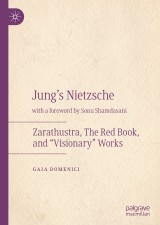Details

Jung's Nietzsche
Zarathustra, The Red Book, and “Visionary” Works|
90,94 € |
|
| Verlag: | Palgrave Macmillan |
| Format: | |
| Veröffentl.: | 29.07.2019 |
| ISBN/EAN: | 9783030176709 |
| Sprache: | englisch |
Dieses eBook enthält ein Wasserzeichen.
Beschreibungen
<p></p><p>This book explores C.G. Jung's complex relationship with Friedrich Nietzsche through the lens of the so-called 'visionary' literary tradition. The book connects Jung's experience of the posthumously published <i>Liber Novus</i> (<i>The Red Book</i>) with his own (mis)understanding of Nietzsche's <i>Zarathustra</i>, and formulates the hypothesis of Jung considering <i>Zarathustra</i> as Nietzsche's <i>Liber Novus</i> –– both works being regarded by Jung as 'visionary' experiences. After exploring some 'visionary' authors often compared by Jung to Nietzsche (Goethe, Hölderlin, Spitteler, F. T. Vischer), the book focuses upon Nietzsche and Jung exclusively. It analyses stylistic similarities, as well as explicit references to Nietzsche and <i>Zarathustra</i> in <i>Liber Novus</i>, drawing on Jung's annotations in his own copy of <i>Zarathustra</i>. The book then uses <i>Liber Novus</i> as a prism to contextualize and understand Jung's five-year seminar on <i>Zarathustra</i>: allthe nuances of Jung's interpretation of <i>Zarathustra</i> can be fully explained, only when compared with <i>Liber Novus</i> and its symbology. One of the main topics of the book concerns the figure of 'Christ' and Nietzsche's and Jung's understandings of the 'death of God.'</p><br><p></p>
<p></p><p></p><p>Chapter 1: Introduction.- Chapter 2: ʻVisionaryʼ Works And <i>Liber Novus.- </i>Chapter 3: Nietzsche In <i>Liber Novus.- </i>Chapter 4: <i>Liber Novus </i>In Nietzsche: Jungʼs Seminar On <i>Zarathustra.- </i>Chapter 5: Conclusion. </p>
<p><br></p><p></p><p></p>
<p><br></p><p></p><p></p>
<p><b>Gaia Domenici</b> is Honorary Research Fellow at the Institute for Advanced Studies, University College London, UK.</p><p></p>
<p></p><p>This book explores C.G. Jung's complex relationship with Friedrich Nietzsche through the lens of the so-called 'visionary' literary tradition. The book connects Jung's experience of the posthumously published <i>Liber Novus</i> (<i>The Red Book</i>) with his own (mis)understanding of Nietzsche's <i>Zarathustra</i>, and formulates the hypothesis of Jung considering <i>Zarathustra</i> as Nietzsche's <i>Liber Novus</i> –– both works being regarded by Jung as 'visionary' experiences. After exploring some 'visionary' authors often compared by Jung to Nietzsche (Goethe, Hölderlin, Spitteler, F. T. Vischer), the book focuses upon Nietzsche and Jung exclusively. It analyses stylistic similarities, as well as explicit references to Nietzsche and <i>Zarathustra</i> in <i>Liber Novus</i>, drawing on Jung's annotations in his own copy of <i>Zarathustra</i>. The book then uses <i>Liber Novus</i> as a prism to contextualize and understand Jung's five-year seminar on <i>Zarathustra</i>: allthe nuances of Jung's interpretation of <i>Zarathustra</i> can be fully explained, only when compared with <i>Liber Novus</i> and its symbology. One of the main topics of the book concerns the figure of 'Christ' and Nietzsche's and Jung's understandings of the 'death of God.'</p><br><p></p>
Explores how Jung's opinion on Nietzsche changes and develops throughout Jung's life Discusses the figure of 'Christ' and Nietzsche's and Jung's understandings of the 'death of God' Offers a close reading of the Red Book in the light of Jung’s later seminar on Thus Spoke Zarathustra
“Since the publication of <i>Liber Novus </i>an increasing wealth of historical material on C.G. Jung has seen the light of the day. Against the background of these new insights the research in Jung’s philosophical reception needed revision and revaluation. Domenici’s monography does precisely that in the case of Jung’s reading of Nietzsche. Her detailed analysis places a novel and revealing emphasis on the role of <i>Thus spoke Zarathustra</i> for Jung’s visions of the <i>Liber Novus.</i>” (Martin Liebscher, Principal Research Associate, School of European Language, Culture and Society, University College London, UK)

















